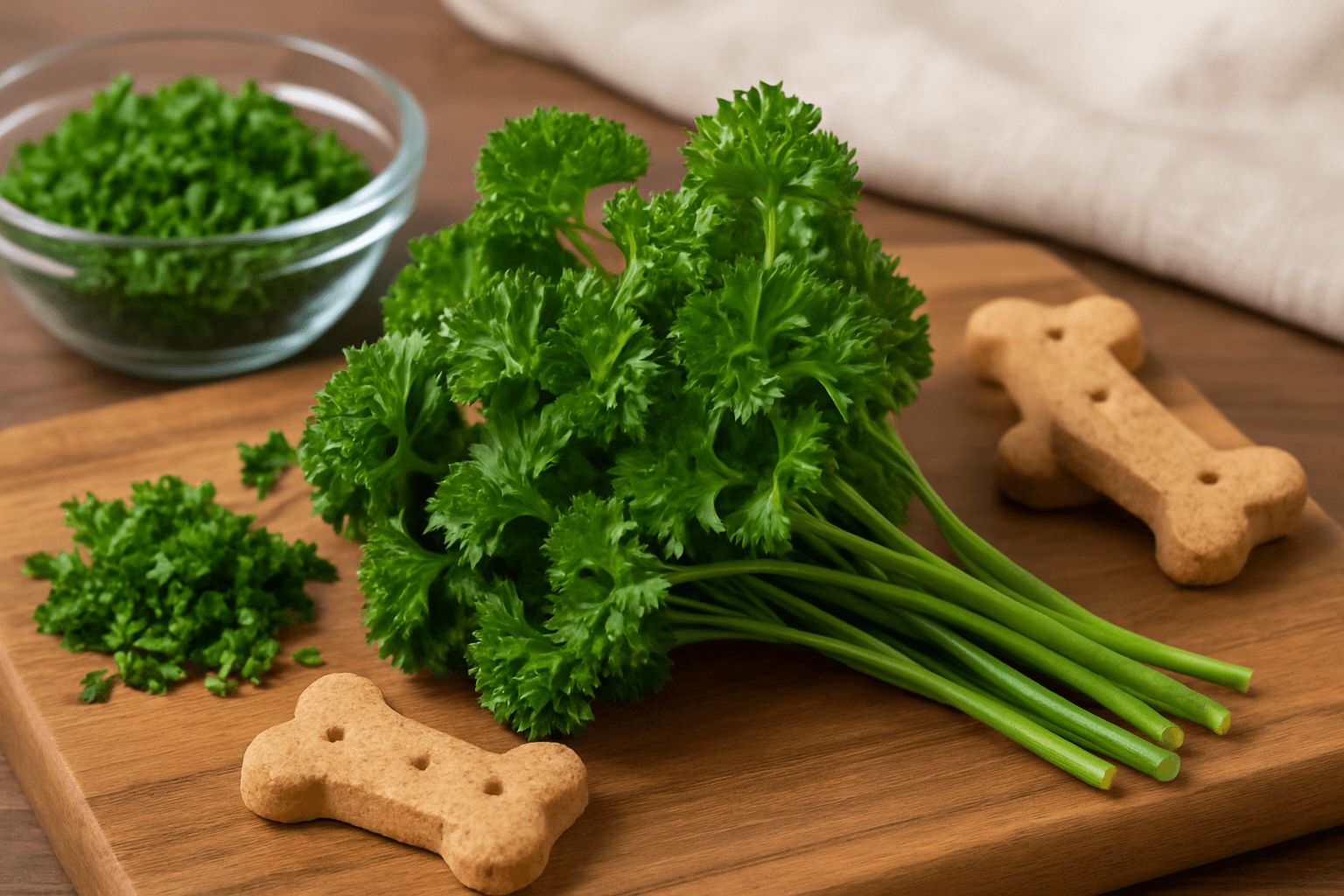If you've ever chopped fresh parsley and had your pup sniffing around, you're not alone. Many pet parents wonder, "Is parsley safe for dogs?" The good news? In small amounts, yes—parsley can be a dog-friendly herb with some pretty impressive perks. But as with anything, there are caveats. Let's dig into this crunchy green garnish and see what it can really do for our furry friends.
Health Benefits of Parsley for Dogs
Parsley is more than a plate decoration. This little herb is packed with nutrients:
- Vitamin C, A, and K – for immune support and healthy vision
- Antioxidants – help reduce inflammation and fight free radicals
- Chlorophyll – a natural breath freshener (say goodbye to stinky dog breath!)
- Diuretic properties – may support kidney and urinary health
As a certified pet blogger, I’ve used parsley in homemade dog treats and even sprinkled it over my dog's meals to help with breath odor and support digestion. It’s a small addition that can make a big difference.
How to Safely Feed Parsley to Dogs
Like all natural remedies for dogs, moderation is key. Too much of a good thing can cause problems. Here’s how to offer parsley safely:
- Use curly-leaf parsley (flat-leaf or spring parsley contains higher levels of furanocoumarins, which can be toxic in large amounts)
- Wash thoroughly to remove pesticides
- Chop it finely and sprinkle over meals (1/4 tsp for small dogs, 1/2 tsp for larger breeds)
- Mix into homemade dog biscuits or broths
Tip: Start small and monitor for any signs of allergy or stomach upset.
When Parsley Can Be Harmful
While parsley is generally safe, there are some exceptions:
- Parsley toxicity in dogs can occur with large quantities, especially from flat-leaf varieties
- Dogs with kidney issues or those pregnant or nursing should avoid parsley
- Always check with your vet before introducing herbs
This is where being a cautious and informed pet parent really counts.
Fun Ways to Use Parsley for Dogs
- Dog breath fresheners (natural): Add parsley to frozen yogurt treats or blend it with mint for a breath-boosting pup pop
- Dog-friendly herb mix: Combine parsley with oregano and basil for a nutrient sprinkle
- Homemade parsley dog treats: Mix chopped parsley into a simple biscuit dough with oat flour and peanut butter
Check out more healthy treats for dogs to boost your pup's diet with delicious, vet-approved ingredients.
Final Woof
So, is parsley safe for dogs? In the right form and amount—absolutely. It’s one of those herbs dogs can eat that’s not only safe but beneficial. From fresh breath to a vitamin boost, parsley earns a gold star in the natural dog wellness toolkit. Just remember: always go curly, go small, and go slow. 🐾
Frequently Asked Questions (FAQs)
1. What kind of parsley is safe for dogs?
2. Can parsley help with my dog’s bad breath?
3. How much parsley can I give my dog?
4. Is parsley toxic to dogs in large amounts?
5. Are there other herbs dogs can eat safely?
6. Can I use dried parsley for my dog?

About SniffnTail
SniffnTail is your go-to destination for everything pets. From helpful advice, tips, and insights to thoughtfully selected products and resources, we’re here to support pet owners at every stage of their journey. Whether you're caring for a playful pup, a wise old cat, or anything in between, SniffnTail offers tools and knowledge to make pet parenting easier and more joyful.
Related Articles
 Nutrition • 5 mins Read
Nutrition • 5 mins ReadThe Best Dog Food by Breed: A Comprehensive Guide
Feeding your dog a diet tailored to its breed can significantly enhance its health, energy, and longevity. Different breeds have unique needs due to their size, metabolism, activity level, and genetic predispositions. Here is a detailed guide to the best types of food for various dog breeds
 Nutrition • 5 mins Read
Nutrition • 5 mins ReadCoconut Oil for Dogs: Benefits, Uses & Safety Tips Every Pet Parent Should Know
Coconut oil has made its way from kitchen shelves to wellness routines—and now, it’s a rising star in the world of pet care. If you’re a dog parent wondering whether coconut oil is good for dogs, the short answer is yes—but with some precautions. This natural remedy has gained popularity for its range of potential health benefits, from shiny coats to digestive support.
 Nutrition • 6 min read
Nutrition • 6 min readCan Dogs Eat Oranges? What Every Pet Parent Needs to Know About Citrus Fruits
Are oranges safe or harmful to dogs? Learn the truth about dogs eating citrus fruits, plus health tips and feeding dos and don'ts from a certified pet expert.

